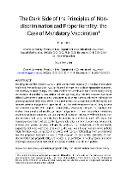Dark Side of the Principles of Non-discrimination and Proportionality : the Case of Mandatory Vaccination

Publication date
2023Published in
Journal of Medical EthicsVolume / Issue
2023 (august)ISBN / ISSN
ISSN: 0306-6800Metadata
Show full item recordCollections
This publication has a published version with DOI 10.1136/jme-2023-108998
Abstract
Deciding the conflict between various rights and interests, especially in medical ethics where health and lives are in question, has significant challenges, and to obtain appropriate outcomes, it is necessary to properly apply the principles of non-discrimination and proportionality. Using the example of mandatory vaccination policies, we show that this task becomes even more difficult when these principles lead us to counterintuitive and paradoxical results. Although the general purpose of these principles is to ensure that decisions and policies seek the highest and broadest possible enjoyment of rights for all (i.e., the least restrictive solution), they achieve the complete opposite when applied to mandatory vaccination policies. To highlight and explain these paradoxical results, we present a typology of fifteen hypothetical mandatory vaccination policies containing various degrees of restriction and apply well-established non-discrimination and proportionality tests from constitutional law to each. We argue that mandatory vaccination policies exhibit two characteristics, namely the non-linear relationship between their general purposes and specific goals and the involvement of life and health, suggesting that more restrictive policies should prevail even though less restrictive policies might fail these tests. Using clearly structured and rigorous methodology from constitutional law, the proposed approach delivers a fresh view on the core ethical principles of non-discrimination and proportionality and a potentially useful tool in helping resolve also other challenges encountered in medical ethics beyond mandatory vaccination policies.
Keywords
mandatory vaccination, proportionality, non-discrimination, vaccination policy
Permanent link
https://hdl.handle.net/20.500.14178/2247License
Full text of this result is licensed under: Creative Commons Uveďte původ-Neužívejte dílo komerčně 4.0 International





